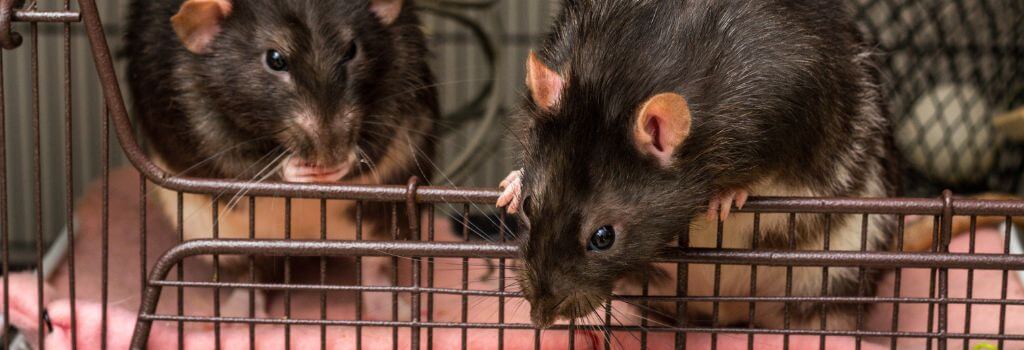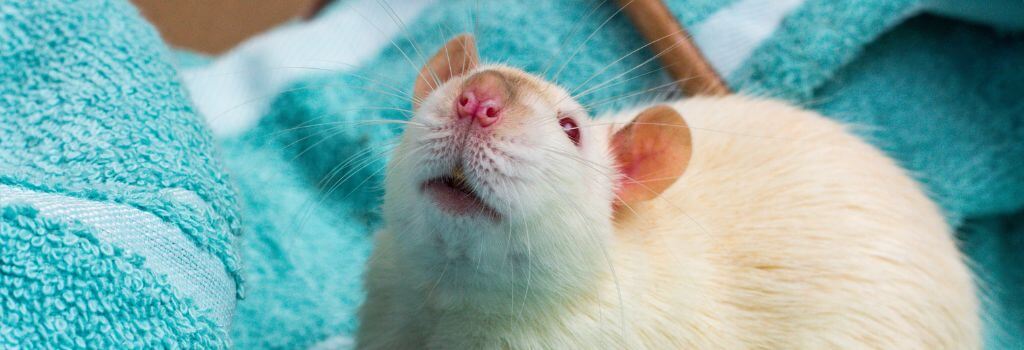Fancy rats are popular pets — and for good reason! These intelligent, social creatures make lovely companions for those willing to provide the proper care and attention. As veterinarians, we get to witness the joy these little animals bring to their owners’ lives. Unfortunately, we also witness the devastating effects of poor husbandry.
If you’re considering adding a fancy rat to your family or looking to improve your current rat care routine, you’re in the right place! This guide will help you give your rat(s) the healthiest and happiest life possible.
Choosing Your Fancy Rat
When selecting a fancy rat, choosing a reputable breeder or rescue organization is crucial. Look for rats with bright eyes, clean fur, and active behavior. Avoid rats with discharge from the eyes or nose, labored breathing, or lethargy, as these can be signs of illness. Also avoid rats in the same environment with other ill rats and crowded, unclean environments.
Fancy rats are social animals, so it’s best to adopt at least two rats of the same sex. Doing so ensures they have companionship and can engage in natural behaviors like grooming and playing together.

Housing Your Fancy Rat
A proper habitat is essential for your rat’s well-being. Choose one that is spacious with plenty of room for movement and exploration. A good rule of thumb is to provide at least two cubic feet of space per rat. Wire cages with multiple flat, smooth surfaces for levels are ideal — for this the cage needs to be chew proof, non-toxic metal, such as powder coated. Wire needs to be smooth and rounded.(- do not want them climbing on wire as this can hurt their feet).
The cage should have a solid bottom, platforms and climbing/tunnel tools to prevent injury to your rat’s feet. Line the bottom with safe bedding materials like: SOFT aspen shavings, cardboard, or paper bedding. Consider lining shelves with fleece. Rats love snuggling up in it! Avoid cedar or pine shavings, which can cause liver disease, weaken the immune system, or lead to respiratory illness.
Equip the cage with accessories to keep your rats entertained and comfortable.
Your rats’ cage should have:
- Hiding spots: Small boxes, tunnels, or hammocks provide security and privacy.
- Exercise wheel: Choose a solid surface wheel to prevent injury.
- Chew toys: Wooden blocks or safe chew toys help maintain dental health.
- Water bottle: Provide fresh, clean water daily.
- Food bowl: Use a heavy ceramic bowl to prevent tipping.
Remember to clean the cage thoroughly at least once a week and spot-clean daily to maintain a hygienic environment.
Nutrition for Fancy Rats
A balanced diet is crucial for your fancy rat’s health. Commercial rat food supplemented with fresh fruits and vegetables should form the foundation of their diet. Choose a high-quality pellet food formulated for rats, as seed mixes can lead to selective eating and nutritional imbalances.
Offer small amounts of fresh foods daily, such as:
- Leafy greens (kale, spinach, romaine lettuce)
- Carrots
- Peas
- Berries (strawberries, blueberries)
- Apple (seeds removed)
- Cooked lean meats (chicken, fish)
Avoid foods that are toxic to rats, including:
- Chocolate
- Caffeine
- Alcohol
- Avocado
- Raw beans
- Citrus fruits (in large quantities)
Always introduce new foods gradually to prevent digestive upset. Provide fresh water daily, and clean the water bottle regularly to prevent bacterial growth.
Health Care for Fancy Rats
Regular health check-ups are essential for maintaining your rat’s well-being. As veterinarians, we recommend bringing your rat in for an annual examination to catch potential health issues early. Monitor your rat for any changes in behavior, appetite, or appearance between visits, and schedule a vet appointment right away if you suspect problems.
During an appointment, your veterinarian will perform a thorough physical examination, checking your rat’s weight, teeth, eyes, ears, and overall body condition. They may also recommend preventive care measures or additional tests.
As rats age, they may become more susceptible to certain health issues, making these regular check-ups even more important. Your veterinarian can provide guidance on adjusting your rat’s care as they enter their senior years.
Common health concerns in fancy rats include:
- Respiratory infections: Watch for sneezing, wheezing, or nasal discharge.
- Tumors: Regularly check for unusual lumps or bumps, especially in older rats.
- Dental problems: Look for overgrown teeth or difficulty eating.
- Skin issues: Monitor for hair loss, scratching, or skin irritation.
Maintaining a clean environment, providing a balanced diet, and ensuring proper ventilation prevents many health issues. However, if you notice any concerning symptoms, don’t hesitate to contact your veterinarian.
Handling and Socialization
Fancy rats are social creatures, and they thrive on interaction with their human caregivers. Regular handling builds trust and helps you maintain a strong bond with your pet. After bringing your rat home, give them a few days to acclimate to their new environment before attempting to handle them.
Start by offering treats from your hand, allowing your rat to become comfortable with your presence. Once they seem at ease, gently scoop them up, supporting their entire body.
Always handle your rat carefully and patiently, and avoid sudden movements that might startle them. Spend time interacting with your rats daily, offering playtime outside their cage in a secure, rat-proofed area. This not only provides mental stimulation but also strengthens your bond. Some rats enjoy riding on their owner’s shoulders or exploring pockets, while others prefer playing with toys or solving puzzles.
Enrichment and Mental Stimulation
Fancy rats are highly intelligent animals that require mental stimulation to thrive. Providing a variety of enrichment activities prevents boredom and promotes natural behaviors.

Some great ways to provide mental stimulation for fancy rats include:
- Foraging activities: Hide treats around their cage or in puzzle toys to encourage natural foraging behavior.
- Climbing structures: Create a rat-friendly jungle gym using ropes(make sure ropes are large enough and somewhat stiff to avoid entanglement of a limb), branches, and platforms.
- Digging box: Fill a shallow container with shredded paper or another safe substrate for digging.
- Training sessions: Teach your rat simple tricks using positive reinforcement techniques.
- Rotating toys: Regularly introduce new toys and remove others to maintain interest.
Always supervise your rats during playtime outside the cage, and remove any potentially harmful items from their reach.
Grooming and Hygiene
While rats are clean animals that groom themselves, they may occasionally need assistance. Most rats enjoy gentle brushing with a soft-bristled brush, which can help remove loose fur and distribute natural oils. Grooming sessions are also excellent opportunities to check for skin issues or abnormalities.
Bathing is rarely necessary for fancy rats unless they become excessively dirty. If bathing is required, use lukewarm water and a mild, pet-safe shampoo. Be sure to rinse thoroughly and dry your rat completely to prevent chilling.
Nail trimming may be necessary if your rat’s nails become overgrown. Ask your veterinarian for guidance or assistance if you’re uncomfortable with this task.
Creating a Rat-Friendly Home
When allowing your rats out of their cage for supervised playtime, creating a safe environment is essential.
Rat-proof your home by removing or securing:
- Electrical cords
- Toxic plants
- Small objects that your rats could swallow
- Gaps or openings where a rat might escape or become stuck
Provide climbing structures, tunnels, and hiding spots to make the play area engaging and stimulating.
Understanding Rat Behavior
Fancy rats communicate through vocalizations, body language, and scent marking. Learning to interpret these cues can help you better understand your rat’s needs and emotions.
Common rat behaviors include:
- Bruxing (teeth grinding): Often a sign of contentment or relaxation
- Boggling (eyes bulging): Usually accompanies bruxing and indicates happiness
- Tail wagging: Can signify agitation or excitement, depending on the context
- Scent marking: A natural behavior to establish territory
- Play fighting: Normal social behavior between rats, but monitor to ensure it doesn’t escalate
By observing and understanding these behaviors, you can create a more harmonious relationship with your fancy rats.
The Fancy Rat Recap
Fancy rats make wonderful pets for those willing to provide them with proper care, attention, and love. Following this care guide, you can create a nurturing environment that helps your rats thrive. Each rat has their own personality, and part of the joy of rat ownership is discovering and appreciating these individual traits.
If you’re considering adding a fancy rat to your family or have questions about your current rat’s care, we encourage you to schedule an appointment with a veterinarian experienced in exotic pet care. We can provide personalized advice and ensure your furry friend receives the best possible care throughout their life. Your rat’s health and happiness are our top priorities, and we’re here to support you every step of the way in your journey as a fancy rat owner.
Don't have a vet in your area yet? We can help you find a local veterinarian.
If you have more questions, the GeniusVets Teletriage platform will give you unlimited access to text and/or video calls with board-certified veterinarians! To learn more click here.
